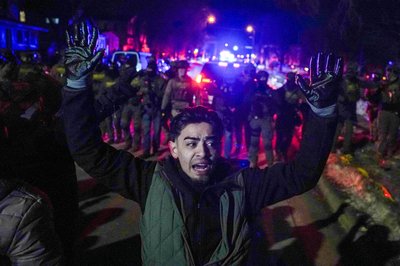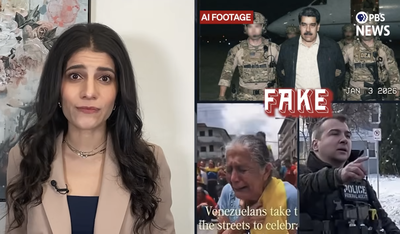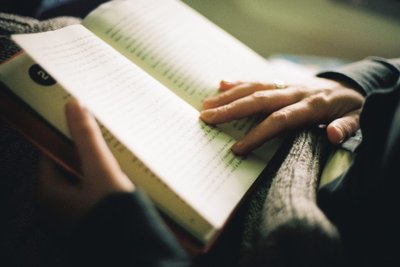Overview
Frances Kai-Hwa Wang is a journalist for PBS NewsHour and NBC News Asian America. Her new book, "You Cannot Resist Me When My Hair is in Braids ," is a set of lyric essays about Asian American identity, family, heartbreak, love and self-discovery. On July 8, Wang sat down with NewsHour Classroom intern Evelyn Chi to discuss her new book. An excerpt of the interview is printed below.
To follow along with this excerpt, the short version of the interview is linked here .
You can listen to the full, edited interview here .
Q&A
NewsHour Classroom’s Evelyn Chi: There is this line in your first essay on page four that struck me. It says, "I am the dream of the diaspora, but I am lost." I thought that was a really powerful sentence that encapsulated a lot of the complex emotions children of immigrants feel trying to fulfill the expectations and dreams of previous generations. Could you elaborate on that line and talk a little bit more about how it relates to your book in your life?
Definition of diaspora from Merriam-Webster: “the movement, migration, or scattering of a people away from an established or ancestral homeland”
Frances Kai-Hwa Wang: Sure. So that is from a piece called "Dreams of the Diaspora," and it exists as a multimedia video piece at the Smithsonian Asian Pacific American Center. It is a conversation between an immigrant and a child of immigrants bickering back and forth about who has it worse, which is never a good conversation. It talks about the contradictions that, a lot of times, the immigrant generation can't see and the next American-born generation doesn't always fully appreciate. That one line talks about the expectations of our immigrant parents and what they want for us.
Our families always want us to be safe. They don't want us to be artists because they want us to be safe. Yet everything our families do, they do for us. So there's a tension and a contradiction.
EC: Since NewsHour Classroom is all about education and students, if you were to teach your book in a high-school classroom setting, what is the most important idea or lesson that you would want a student reader to take away?
FW: I would talk about the idea of identity. Identity is not something that happens in one a-ha moment. There's a lot of Asian American novels and memoirs out there where you’ve got your childhood, and you fight with your parents and fight with the bullies. You go to college, you have an Asian American studies class and then a-ha – you figure out your identity and the book is over, right? I think it's more complicated than that. And it's a constant process that you go through your whole life and it's different at every stage of life.
"Identity is not something that happens in one a-ha moment. It's a constant process that you go through your whole life and it's different at every stage of life."
EC: I know you were mainly addressing the Asian American student reading this, but what about students of other races of non-Asian identities?
FW: Well, Asian-American stories are accessible to a lot of people who have immigration in their history or the experience of being a minority of some sort. And for those who don't have an experience of that, it's good to read about other people's experiences so you learn and add to your vocabulary of how people experience the world.
EC: I wanted to talk about the style of memoir and how it can be kind of difficult to write and share because of how personal these topics can be. How did you decide on what to include and what not to include? Do you ever worry about the people in your book reading your writing?
FW: So this is prose poetry and lyric essay. In terms of form, it navigates right in the center of fiction and nonfiction. And I don't call it a memoir, but certainly it is. This is probably the most creative of the things that I've written. As a columnist and essayist, you want to keep it all true. Prose poetry and lyric essay — I have a little bit more space to be creative, and so I really tried to be creative with this book.
In terms of the people who show up in my book, I always tell people when I first meet them like, look, I'm a writer. I write about everyone I meet. Don't tell me any secrets because I can't keep secrets. And if I like you, I will go to great pains to protect you and disguise you and take care of you. I never identify people by their full names.
EC: How does your work as a journalist, especially as one reporting on Asian-American issues and politics, influence your creative writing, and vice versa?
FW: I've been writing about Asian American issues and almost my entire writing career. One of my first jobs was writing for IAmDiversity.com Asian-American Village, which was one of the first online Asian-American magazines. And then I ended up writing a lot about social justice issues, hate crimes and the hard parts of our experience as well. A lot of times when you're writing it as a journalist, there are certain norms and rules. You have to be objective enough to keep it straight; keep your personal opinions out of it unless you're writing an essay.
"News doesn't just stay on the page. News comes into your life and is there all the time and affects how you live life."
But then at the end of the day, we're still people. So we still have an emotional reaction. So I would take that emotional reaction and put it into prose poetry. If something happens in the community, for example, and I'm writing for an Asian American newspaper, the first inclination would be to write the germs of the piece. Then you write the essay piece, which is the reaction and the opinion, and then whatever's left, you put into poetry to deal with the emotional fallout. Because news doesn't just stay on the page. News comes into your life and is there all the time and affects how you live life.
Evelyn Chi, a rising sophomore at Amherst College and intern with NewsHour Classroom, conducted and edited this Book Q&A with additional editing by Luke Gerwe.





